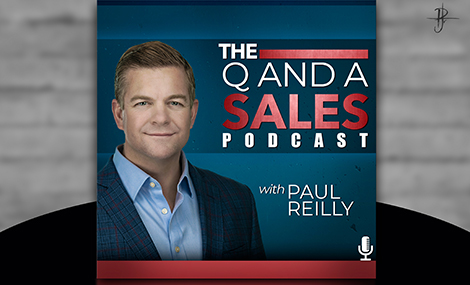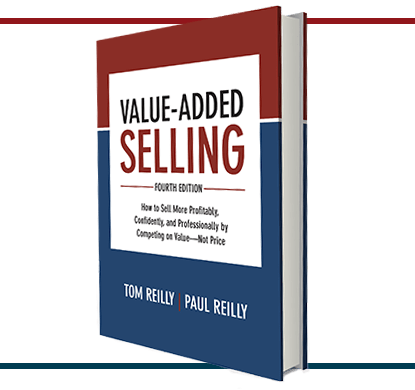What if your competitor has cheaper prices and more product? In this episode, Paul shares three ideas to sell more effectively when you are the underdog.
Show Notes:
“There is the constant back-and-forth question regarding small and large competitors.” Big companies can’t do what small companies can and vice versa.
“In Value-Added Selling, over 600 customers indicated that price was not the most important thing. In fact, there are ten things more important than price.” Don’t be fooled into thinking that price is the most important factor. It’s a factor, not the factor.
“What kind of value are you personally bringing?” All things being equal, the salesperson represents that one unique dimension of value.
Your knowledgeable expertise is critical. Knowledge ranked higher than product availability. “Your availability of knowledge has to be greater than your competitor’s availability of product.”
***
Our show is updated weekly with the questions you ask. So, please go to the home page, subscribe, share it with your friends, but most importantly, ask the question that you want answered.
The Q and A Sales Podcast is edited by The Creative Impostor Studios. Book a complimentary consultation about your show at http://www.thecreativeimpostor.com/qanda
Thank you for tuning in. Make it a big day.
http://www.theqandasalespodcast.com
How do I sell against a competitor with better pricing and availability?
(Transcribed from podcast)
Today, we have a question from Albert. Albert went to our website, TheQandASalesPodcast.com, and asked a question. We’re going to turn that question into an answer for you today. The question is, “How do I provide value to customers when I have a big competitor around the block that, based on price and availability, has the upper hand?”
Albert is selling for a roof tile manufacturer. He goes on to mention that his primary customers are going to be, not only distributors that are going to be reselling his product, but it looks like maybe some of the contractors and builders—he might be working directly with them as well.
Before we get started answering that question, a big shout-out to The Creative Impostor Studios. More and more people are listening to podcasts, so, if you’re looking to grow your audience, or just communicate more effectively with your customers, or add value to your community/your stakeholders, consider starting a podcast. Many of the big companies that I work for now are creating internal podcasts. It’s an effective way to communicate, not only with your customers, but with your internal team. Also, during these tough times, where people are socially distancing, stuck in lockdown at their house, it’s just one more way to stay connected. Check them out. Andrea and her team have put together a complimentary consultation. For a twenty-minute consultation you can visit with them. They’re going to share thoughts, ideas. Information on that will be on this episode’s page, so check that out.
Albert, we’re going to answer your question. This is a tough question. What’s funny to me … I work with a lot of big companies—Fortune 500 companies—and, I work with a lot of small and medium-size businesses as well. There always is this back-and-forth question. Some of the small-to-medium-size businesses are asking me, “I’ve got a competitor up the road who has more inventory, who is bigger, who can shut out our lights out if they wanted to. How can I compete with them?”
On the same note, when I’m working with bigger companies, they tell me the same thing only in reverse. They’ll say, “We have this one local competitor who is just driving us crazy. We can’t compete with their service level. We can’t do the things that they do. How do we compete with that?”
With that being said, one thing you’ve got to remember when you’re trying to compete with this bigger competitor who supposedly has an advantage when it comes to price and availability, there are some unique aspects of your solution that you can probably beat that competitor at. We call this a positive comparison. I would talk to your customers and do some random “voice-of-the-customer” research. When your customers are visiting with you or talking with you, just say, “I wanted to gather some data. What do you feel like the most important thing is when you’re selecting a manufacturer?” Give them a list of items to think about—some criteria—and just ask them. Keep it open ended and get a sense of what they say. Sure, people are going to mention price, but price is rarely the most important thing. In fact, in our research on Value-Added Selling, we did a ground-breaking study a few years ago, just to determine how important price was. We asked a group of over 600 customers to rank how important price was. In a list of twelve items, they ranked price as number eleven. Price was number eleven on a twelve-point list. That tells me there are ten things more important to a customer than price. Yeah, price is tangible, it’s straightforward, it’s easy, it’s concrete, but there are ten things more important than just price. Keep that in mind.
Also, availability did make it on that list. Of our list of twelve things that customers want, availability ranked fourth. That means there are three things more important to your customer than availability, and those three things are quality and performance, customer service, and knowledgeable salespeople.
What kind of value are you personally bringing? Think about this. What value do you bring? Why should they want to work with you versus other salespeople? This is always going to be the go-to default response. If you’re not creating enough personal value with what you’re doing, you’re giving the buyer no reason to work with you versus that competitor. Our research shows that the salesperson accounts for about 25 percent of the value. You bring a substantial amount of value. The key is determining what makes you different.
I just mentioned the three things customers want: quality and performance (1), customer service (2), knowledge of the salespeople (3). So, what kind of knowledge are you bringing to the table? How knowledgeable are you about your profession, about your industry, about your customer’s business and how you can help them become more successful?
For example, if you’re selling for a manufacturer, and part of your role is to go out there and sell to distributors and through distribution, you’ve got to remember what the goal of that distributor is. If that distributor is trying to serve their customers better, what are you doing to help them achieve that? How are you leveraging your knowledgeable expertise to help them become a more effective distributor, which, in turn, helps them take care of their customers? I would encourage you to increase your knowledge, your expertise. Become a true student of your profession. That means you have to study about your industry—what’s going on, trends—and be able to deliver insight. Be able to provide feedback and help your customers make better decisions.
This is an area where you have to play the long game. To increase your knowledge, think of it like inventory. Every piece of information you learn is like putting inventory on shelves. You’re putting your knowledge on a shelf of inventory that you can pull from at a later date. Your availability of knowledge has to be greater than your competitor’s availability of product. Think of it that way. Knowledge of the salesperson ranked more important than product availability. I would encourage to become a student of your profession.
For example, a group I was doing some work with— I had a chance to go out in the field with one of their salespeople. This is a distributor in the automotive parts supply industry. This is one of their top-achieving salespeople. As we were going out and visiting with customers and prospects, we met with one of his top customers. While we were on that sales call, we didn’t talk about automotive parts and pieces. Instead, we went out to the parking lot and the owner of the company was sharing his ideas about expanding the parking lot. The salesperson was actually able to deliver some insight and some ideas on how they should design it to help that owner make a good decision. That salesperson demonstrated their knowledgeable expertise in that moment. Whether that salesperson knows it or not, they’re making themselves an inseparable part of their solution. Their phone is going to keep ringing as a result of that.
The tip you’ve got to go with… How can you increase your personal value to this customer? Focus on your knowledgeable expertise, deliver on what you promise, actively look for problems you can solve for this particular customer.
Make it a big day!


